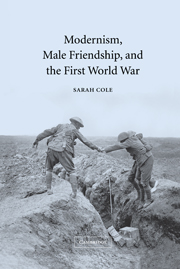Book contents
- Frontmatter
- Contents
- Acknowledgments
- Introduction
- 1 Victorian dreams, modern realities: Forster's classical imagination
- 2 Conradian alienation and imperial intimacy
- 3 “My killed friends are with me where I go”: friendship and comradeship at war
- 4 “The violence of the nightmare”: D. H. Lawrence and the aftermath of war
- Notes
- Index
1 - Victorian dreams, modern realities: Forster's classical imagination
Published online by Cambridge University Press: 22 September 2009
- Frontmatter
- Contents
- Acknowledgments
- Introduction
- 1 Victorian dreams, modern realities: Forster's classical imagination
- 2 Conradian alienation and imperial intimacy
- 3 “My killed friends are with me where I go”: friendship and comradeship at war
- 4 “The violence of the nightmare”: D. H. Lawrence and the aftermath of war
- Notes
- Index
Summary
He was thinking of the irony of friendship – so strong it is, and so fragile. We fly together, like straws in an eddy, to part in the open stream. Nature has no use for us: she has cut her stuff differently. Dutiful sons, loving husbands, responsible fathers – these are what she wants, and if we are friends it must be in our spare time. Abram and Sarai were sorrowful, yet their seed became as sand of the sea, and distracts the politics of Europe at this moment. But a few verses of poetry is all that survives of David and Jonathan.
E. M. Forster, The Longest JourneyForster is often remembered as a modernist who believed in “personal relationships.” An acute social critic with a persistent ironic vision, he nevertheless retained a core belief in the enduring power of intimate ties to mitigate against an increasingly authoritarian and mechanized world. At the same time, passages like this one from The Longest Journey, which express a sense of pathos about the potential for male love to be articulated and realized, blend Forster's faith in small-scale humanity with his most private desire. If the erotics are shepherded in quietly, they effectively transform the passage from an example of youthful sentiment into a depiction of more empathetic, adult desire. Such saturated language about friendship would seem to proceed directly out of Forster's personal fantasies, to function in part as a sexualization of his humanist ideal.
- Type
- Chapter
- Information
- Modernism, Male Friendship, and the First World War , pp. 21 - 91Publisher: Cambridge University PressPrint publication year: 2003



